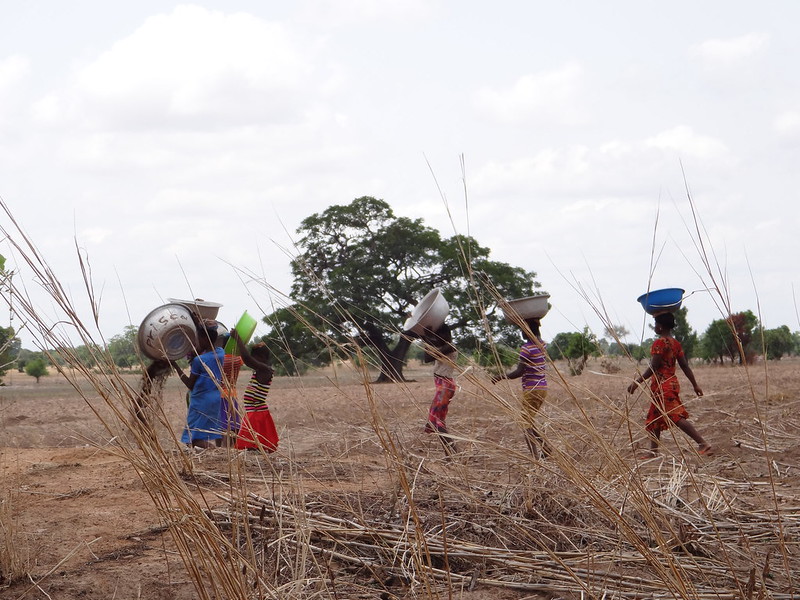Food Insecurity in Ghana: Challenges and Progress
 Ghana, located in West Africa and home to more than 30 million people, is known for its traditional rain-fed agriculture. The country features both rural and urban areas stretching from the north to the south, where farmers, including those on the world’s second-largest cocoa farms, produce a variety of products. Unfortunately, food insecurity is rising again as farmers contend with inflation and an unstable climate. While Ghana has made significant progress in reducing malnutrition and hunger over the past 20 years, famine and inflation continue to pose ongoing challenges.
Ghana, located in West Africa and home to more than 30 million people, is known for its traditional rain-fed agriculture. The country features both rural and urban areas stretching from the north to the south, where farmers, including those on the world’s second-largest cocoa farms, produce a variety of products. Unfortunately, food insecurity is rising again as farmers contend with inflation and an unstable climate. While Ghana has made significant progress in reducing malnutrition and hunger over the past 20 years, famine and inflation continue to pose ongoing challenges.
Advancements and Obstacles
Recovery from COVID-19 and its economic impacts continues, as the pandemic significantly stalled growth in Ghana. The country has set a goal to restore stability after experiencing fluctuations in economic development due to inflation and hunger. In 2023, inflation rates notably decreased from 53.4% in Jan. to 23.2% in Dec. However, consistent progress slowed at the beginning of 2024 as inflation began to rise again. This resurgence has led to higher prices for imported goods and a sharp decline in crop production in rural areas.
Information about food security in Ghana became public when several organizations, including the Cadre Harmonisé, conducted assessments and released important findings. In 2023, they estimated that 1.45 million people struggled with hunger and malnutrition from March to May. Analysts initially expected this number to decrease to around 1.3 million from June to Aug. 2023. Contrary to these expectations, the most recent estimates indicate that about 2.2 million people will remain food insecure from June to Aug. 2024.
A report from the World Food Program Country Brief, released in March 2024, estimated that more than one million people in Ghana could face food insecurity between June and Aug. Although these figures represent a decrease from the 2.2 million reported in Nov. 2023, the situation continues to burden farmers who depend heavily on agriculture for their livelihood. Despite improvements in growth and development, food insecurity persists, especially among families in rural areas. Organizations like the World Food Programme (WFP) are working to create a world free from famine.
The World Food Programme
Focused on “saving lives, changing lives,” the World Food Programme (WFP) operates in more than 120 countries, including Ghana, with the goal of achieving “a world with zero hunger.” WFP has assisted many individuals in need and is the largest provider of cash assistance in the humanitarian community. The organization collaborates with partners who share the same goals of increasing food availability and ensuring fair prices for all, such as the Ministry of Food and Agriculture.
Since 1963, the WFP has collaborated with the Ghanaian government to focus on food security, particularly through advocacy for effective food standards via Ghana’s School Feeding Programme. In 2023, WFP helped more than 36,000 people by providing direct cash assistance to address challenges like high food prices. Additionally, WFP works with the government and private sectors to enhance school facilities and has established approximately 150 savings groups to teach digital financial skills. In collaboration with USAID, WFP also supported 17,000 farmers with $5 million in mobile money.
The WFP plays a crucial role in assisting those in need and advocating for a stronger foundation in food security in Ghana. Additionally, the organization disseminates reports and national briefs to keep the public informed about ongoing developments and the success of various efforts.
Moving Forward
The WFP continues its efforts to improve conditions for families in Ghana. According to the WFP Ghana Country Strategic Plan for 2024 to 2028, the organization aims to eradicate poverty by 2028. WFP outlines this goal by detailing key outcomes such as improving nutrition and establishing stable food systems for all. Although food insecurity levels fluctuate, ongoing support plays a crucial role in combating hunger in Ghana.
– Savannah Garza
Savannah is based in New York, NY and focuses on Good News and Global Health for The Borgen Project.
Photo: Flickr
